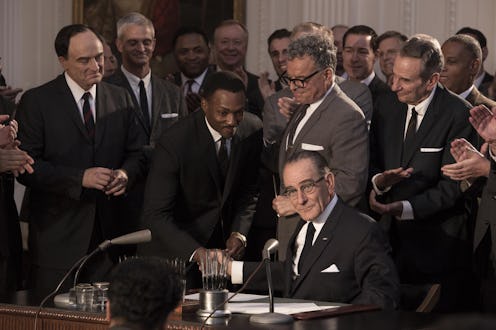Entertainment
'All The Way' Took A Few Creative Liberties

Bryan Cranston has been on a hell of an acting journey. If you're a '90s kid like me, you first saw him as the cartoonish dad on Malcolm in the Middle. It was a huge shift, then, to see him as the milquetoast-Mr.-White-turned-terrifying-Heisenberg on Breaking Bad, which was a very different character, but still an exaggeration. In All the Way, which HBO will premiere on May 21, he shifts to play the real-life Lyndon B. Johnson. Though every work of art takes artistic license, and history is always up to different interpretations, here Cranston has a responsibility to adhere to at least a germ of truth about LBJ. So, how historically accurate is All the Way ?
In the movie, Cranston is reviving a role from the stage play of the same name — one that earned him a Tony award — that covers LBJ's first year in office. Savvy theatergoers have already had a chance to fact-check the material. But it's worth noting that differences between All the Way and the historical record aren't exactly errors. “I’m not a historian, I’m not a documentarian, and I always try to make that distinction,” playwright Robert Schenkkan told the New York Times.
One thing that is surprisingly accurate: Cranston looks like LBJ. I mean, look at this:
It's a pretty striking resemblance, don't you think? The Washington Post reports that it's a result of two and a half hours of makeup each day. Cranston isn't the only on-screen LBJ in recent times, so it'll be interesting to see how his portrayal differs from the one we saw in, say Selma.
Of course, though, not everything in All the Way so closely resembles real life "Several scenes, for example, feature Stokely Carmichael as the voice of radical black youth within the Rev. Dr. Martin Luther King Jr.’s inner circle — even though, in 1964, it was John Lewis who played that role," the same New York Times article notes. "Likewise, the playwright, Robert Schenkkan, has Johnson weaken the voting rights provisions in the Civil Rights Act to make it more palatable to Southern Democrats. This never happened: the provisions were weak to begin with, but Johnson never touched them."
Another historical difference isn't really a change, per se, as much as it is an omission. That's the lack of a Robert Kennedy, who was a major player at the time. "In the play, Robert Schenkkan made the choice to keep Robert Kennedy off-stage to serve as a sort of exaggerated figure of fear for LBJ—a combination of real and imagined threat," director Jay Roach told Mother Jones. Still, it's not too much of a stretch, since, according to Roach, "RFK remained attorney general after JFK's assassination, but he was not that active in the civil rights fights."
So it seems like, as with lots of historical dramas, All the Way changes details while staying true to its own themes. Schenkkan says it best himself in the Houston Chronicle: "You can take liberties ... But what you cannot do is have anybody in the play say or do something that is intrinsically antithetical to who they were."
Images: Hilary Bronwyn Gayle/HBO (3)